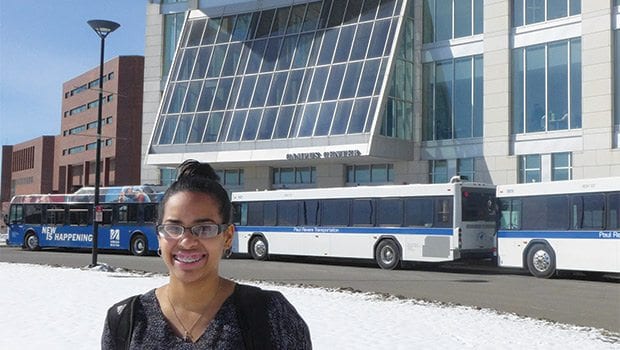
Tuition and student debt are bound to spike throughout the University of Massachusetts system, some education and budget advocates predict — unless serious changes are made to Governor Charlie Baker’s proposed budget.
“[Tuition is] already too much,” said Jojo Reyes, a junior at UMass Boston. She works until midnight at a burrito restaurant three to four nights a week to help afford her studies. Reyes is covering her tuition through a combination of grants, loans and working 25-30 hours a week.
“Those loans are piling up every year,” Reyes noted. “When I graduate, I know it’ll be a big burden to me.”
Baker’s proposal — $539 million budgeted for UMass in fiscal year 2017 — would be a 1.4 percent increase over the current $532 million the university system receives, but a far cry from the $601 million UMass administrators requested. That extra funding is necessary to cover the faculty pay raises resulting from collective bargaining, deferred maintenance costs and financial aid, administrators said in the request they submitted in December.
According to Natalie Higgins, executive director of Public Higher Education Network of Massachusetts, if Baker’s proposal is upheld, it could put higher education costs out of the reach of some students, preventing them from enrolling or forcing them to drop out.
“If fees go up, we see students who can’t afford tuition cost, and end up dropping out after two or three years,” she said. “That’s a huge loss — to have a student who took on student debt and drop out, and still have that debt.”
Ann Scales, spokesperson for UMass’s President’s Office, said that this year, state funding makes up approximately 37 percent of the $1.5 billion UMass spends on core educational needs — items like faculty pay, academic buildings and equipment. UMass spends another $1.6 billion for items such as dining and athletic facilities and research, none of which get state support. The rest of UMass’s funding comes from sources such as tuition and mandatory fees, research grants, dining hall and resident hall fees and renting out campus space, Scales said.
“The result of this budget,” Higgins said in a press release, “will be a significant hike in tuition and fees or cuts to programming integral to keeping our students on the path to completion, simply to keep public higher education campuses level funded.”
Tuition tribulation
There is precedent for thinking tuition will increase. In June 2015, UMass trustees raised tuitions for the first time in three years, citing budget needs. That budget was at a similar level to what the governor proposes for 2017, noted Mass Budget and Policy Center in its analysis of the new proposal.
Even with her grants and job, Reyes said she expects to graduate $15,000-20,000 in debt. For some friends, that number is closer to $30,000, she said. Reyes’ late work hours come on top of 25-30 hours a week spent on schoolwork, a balance, she said, that “gets tiring.”
But Reyes said that even so, UMass is significantly less expensive that other higher education options. Because of this, she expected a $1,000-$2,000 tuition increase would not deter many students from enrolling.
Widespread strain
Under the governor’s budget, programs and faculty may suffer, PHENOM president Kim Selwitz warned in a press release. The effects could include a greater emphasis on using adjunct professors over full-time, struggles to pay for building maintenance and reduction in campus services.
“Baker’s budget relies on the tired argument that public higher education can be just fine if they wring ‘efficiencies’ out of their budgets,” she said. “Here’s what ‘efficiency’ has meant over the past decade: hiring adjuncts with low pay or benefits and no job security; making campuses pay for most of their construction projects out of the regular operating budget, something no other state does; continuing the decline in the number of full time faculty and campus services that help low income and minority students get through to graduation.”
Demand for grads
Easier access to higher education begets an educated workforce — something that brings prosperity to the Commonwealth as a whole, according to a Mass Budget and Policy Center statement. And making that education affordable in-state makes it more likely that graduates will stay in — and grow the economy.
“Public graduates are also more likely to stay in Massachusetts after graduation, contributing to our economy over the long term,” asserts MassBudget’s statement. “Despite the evidence that a highly educated workforce helps strengthen our state economy, Massachusetts has cut state support for higher education by 20 percent since FY 2001, adjusting for inflation.”
Business leaders have a strong demand for college-educated students with levels of debt that can be balanced alongside the cost of living in Massachusetts, said Peter Wilson, press secretary for state Senate President Stan Rosenberg.
“In conversation with business leaders around the state, [the Senate President] has been told that they’re looking for bright students coming out of college with affordable levels of debt, so they can pay them to stay in the state,” Wilson said.
“Public education is about providing access to people who have the ability, but may not have the means,” Wilson added. With this budget proposal, “We’re going in the wrong direction.”
Hope ahead
There still is time for UMass’s budget to change. The House is expected to release its budget in April and the Senate in May, and Senate President Rosenberg has made it clear he supports higher funding, criticizing the governor’s budget as “woefully inadequate.”
“We hope that by end of that process there will be adequate level of funding for UMass,” UMass’s President’s Office spokesperson Ann Scales said. She was hesitant to predict the budget’s effect on tuition, fees or deferred maintenance, emphasizing that there are months of negotiation to go. “[It is] too early in the process to fully grasp what impact the level of state funding would have for us.”






